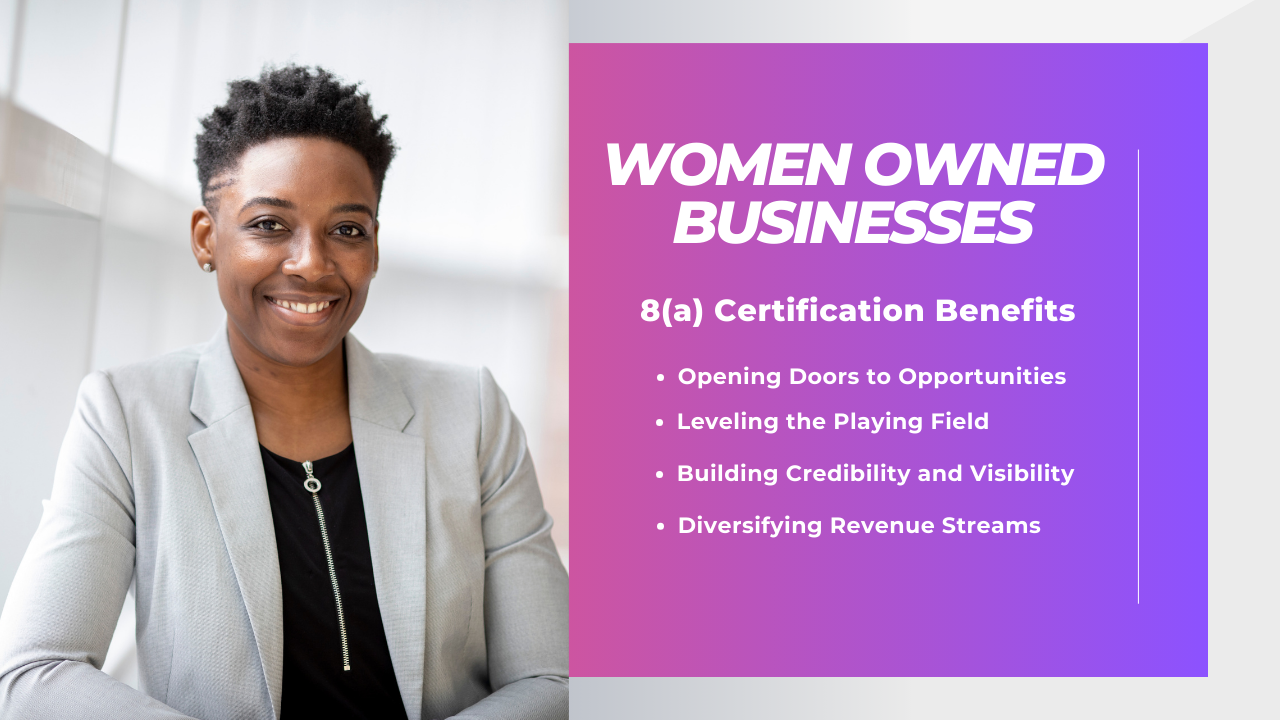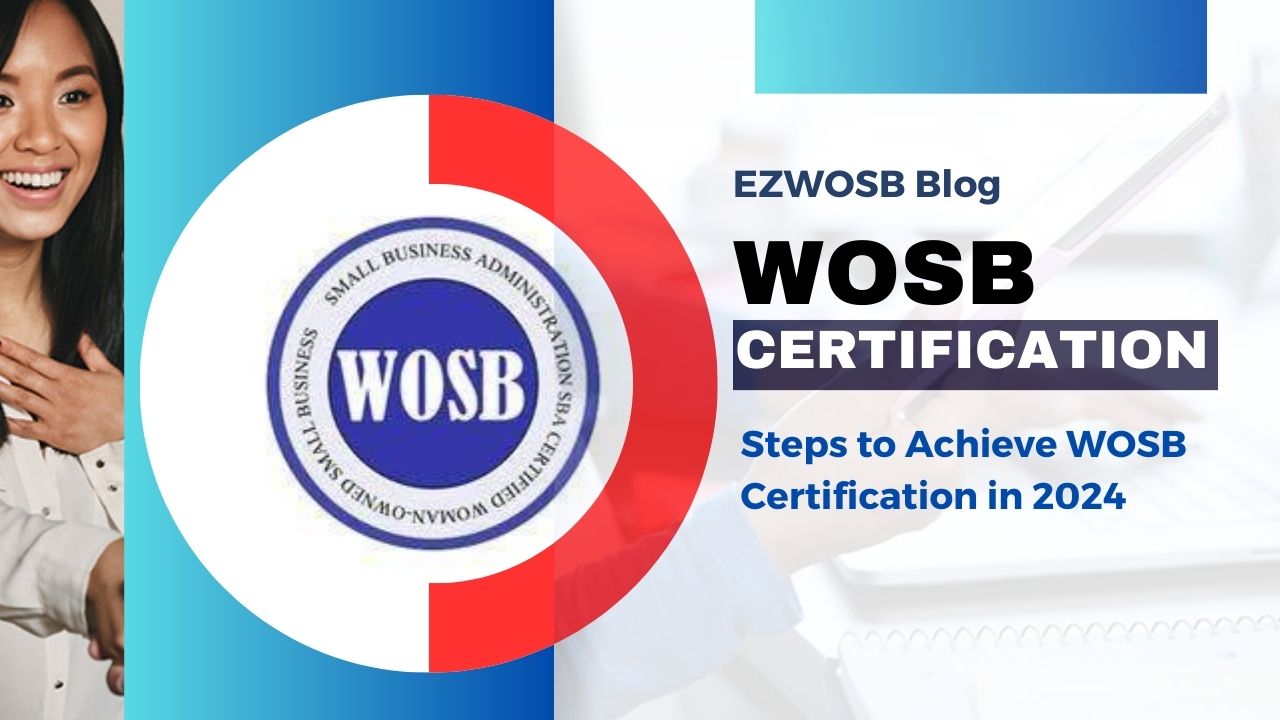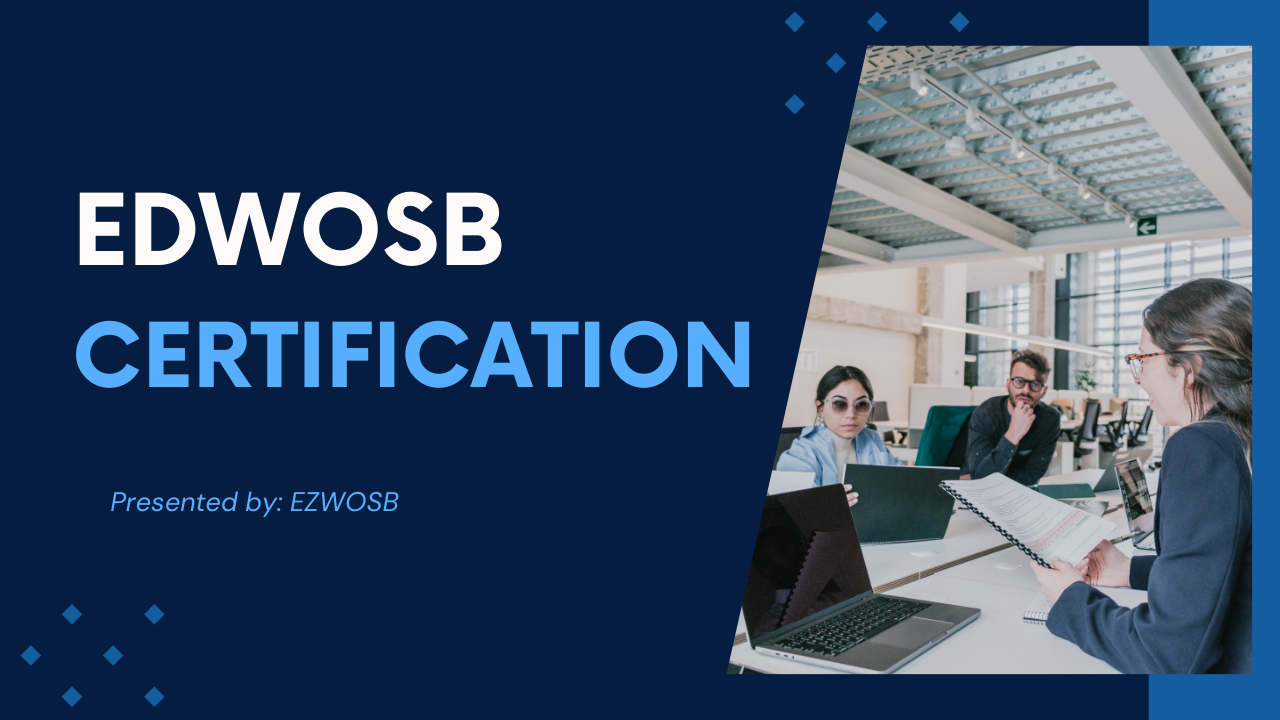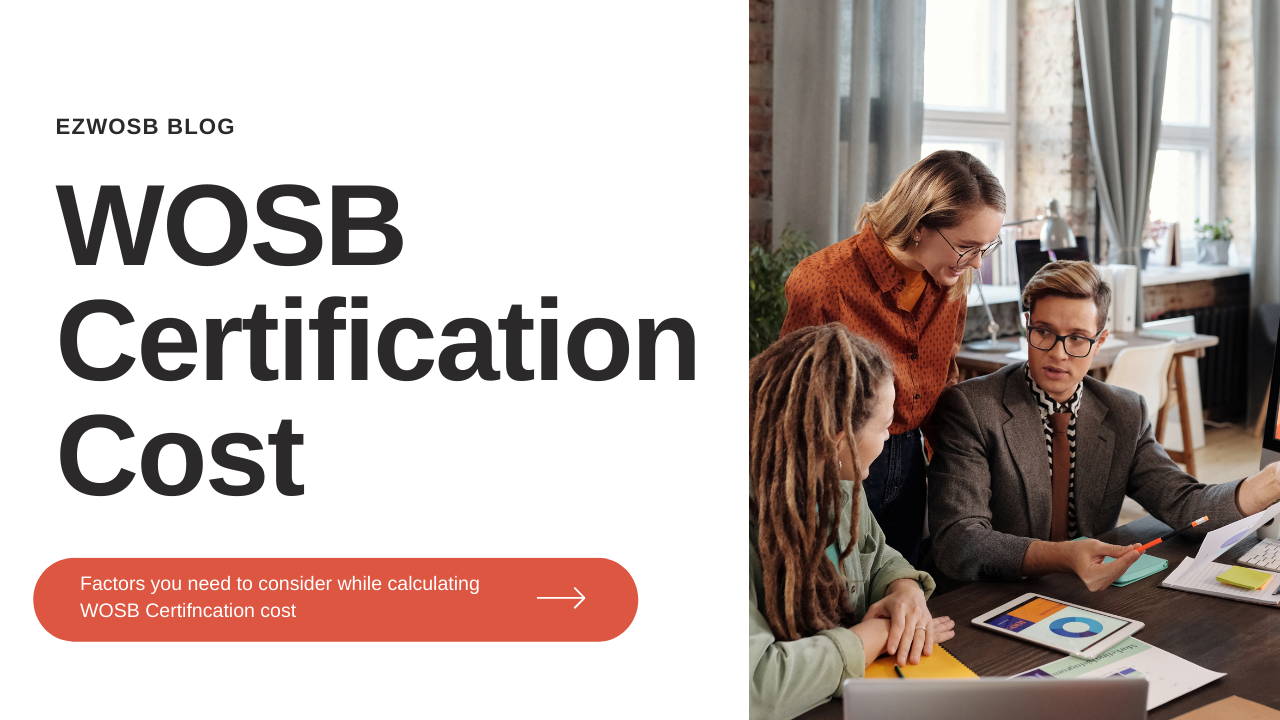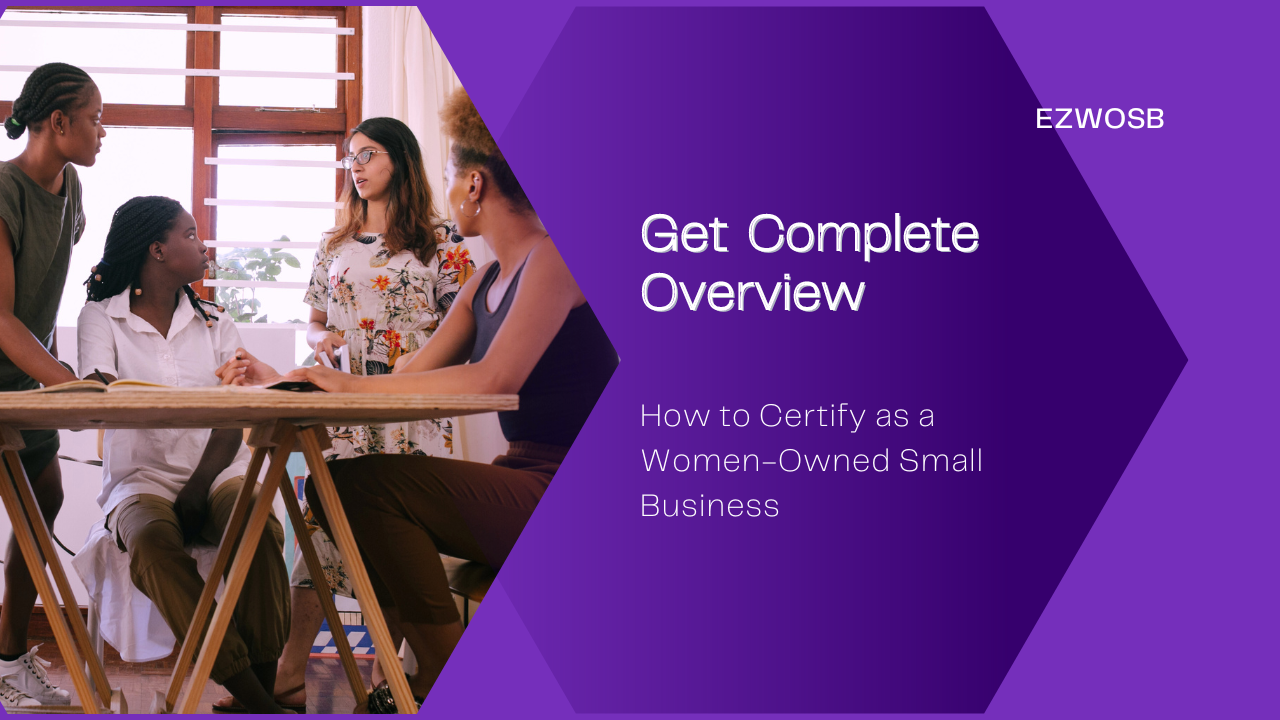In recent years, there has been a growing recognition of the importance of diversity and inclusion in the business world. Women entrepreneurs, despite making significant strides, continue to face unique challenges. To address these challenges and foster the growth of women-owned businesses, the Small Business Administration (SBA) in the United States offers the 8(a) Business Development Program. This blog explores the manifold advantages that women-owned businesses can accrue through 8(a) certification, shedding light on how this program serves as a catalyst for empowerment, growth, and sustainability and the transformative impact that securing government contracts has on women-owned businesses, highlighting how it not only fosters economic growth but also contributes to breaking down longstanding barriers in the business landscape.
Access to Government Contracts:
One of the primary benefits of 8(a) certification for women-owned businesses is the unparalleled access to government contracts. The federal government has set ambitious goals for awarding contracts to small businesses, including those owned by women. Through the 8(a) program, women entrepreneurs gain a competitive edge in securing these contracts, as they are eligible for set-aside contracts and sole-source awards. This not only opens doors to new opportunities but also facilitates the development of a robust portfolio, enhancing the credibility and visibility of women-owned businesses in the marketplace.
- Opening Doors to Opportunities:
Access to government contracts provides women-owned businesses with unparalleled opportunities for growth and expansion. Federal, state, and local governments have recognized the importance of fostering diversity in their supplier base, creating set-aside contracts and programs specifically designed for small businesses, including those owned by women. These opportunities allow women entrepreneurs to compete on a level playing field and showcase their capabilities. - Leveling the Playing Field:
Government contracts play a crucial role in leveling the playing field for women-owned businesses. Historically, women entrepreneurs have faced systemic barriers that limited their access to lucrative contracts and stifled their ability to compete with larger, more established counterparts. Access to government contracts addresses this disparity by creating a fair and competitive environment, where businesses are evaluated based on their merits and capabilities rather than on gender. - Building Credibility and Visibility:
Winning government contracts enhances the credibility and visibility of women-owned businesses. Successfully fulfilling government contracts serves as a testament to the capabilities, reliability, and professionalism of these enterprises. This positive track record not only instills confidence in government agencies but also acts as a powerful marketing tool in the broader business community, attracting attention from other clients and partners. - Diversifying Revenue Streams:
Government contracts provide a stable and diversified source of revenue for women-owned businesses. Relying solely on private sector clients can be challenging, especially during economic downturns. Government contracts, on the other hand, offer a steady stream of work, helping women entrepreneurs navigate economic uncertainties and establish a more resilient and sustainable business model. - Fostering Innovation and Inclusivity:
The process of competing for government contracts encourages women-owned businesses to innovate and adapt. Government agencies often seek out businesses that can offer creative solutions to complex challenges. This demand for innovation drives women entrepreneurs to think outside the box, fostering a culture of creativity and adaptability. Moreover, as women bring unique perspectives to the table, their inclusion in government contracts contributes to a more diverse and inclusive approach to problem-solving. - Challenges and Opportunities:
While access to government contracts brings forth numerous benefits, women-owned businesses may face challenges in navigating the complexities of government procurement processes. However, these challenges also present opportunities for growth and learning. Government-sponsored workshops, training programs, and mentorship initiatives can assist women entrepreneurs in overcoming these hurdles, ensuring they are well-prepared to seize government contracting opportunities.
Business Development Opportunities:
The 8(a) program goes beyond providing access to contracts; it is a comprehensive business development initiative. Women-owned businesses benefit from specialized training, counseling, and mentorship programs tailored to their unique needs. These initiatives empower women entrepreneurs with the knowledge and skills necessary to navigate the complexities of the business world successfully. Mentor-protégé programs, in particular, facilitate valuable partnerships between established businesses and women-owned enterprises, fostering growth and innovation.
Access to Exclusive Contracting Opportunities:
8(a) certification opens the door to exclusive contracting opportunities within the federal government. Women-owned businesses, through the 8(a) program, gain eligibility for set-aside contracts and sole-source awards. This preferential treatment not only increases the likelihood of securing contracts but also provides a competitive advantage by reducing the level of competition, allowing these businesses to showcase their capabilities in a more focused arena.
Building a Robust Past Performance Record:
Success in 8(a) contracting contributes to the development of a robust past performance record. Government agencies often prioritize businesses with a proven track record of fulfilling contracts efficiently and effectively. Women-owned businesses, through successful completion of 8(a) contracts, build credibility and enhance their competitive positioning for future opportunities, both within the government sector and in the broader business landscape.
Enhanced Competitive Positioning:
8(a) certification acts as a powerful tool for enhancing the competitive positioning of women-owned businesses. Past performance evaluations play a crucial role in securing future contracts, and the successful completion of 8(a) contracts bolsters the reputation of these businesses. This positive track record not only instills confidence in government agencies but also positions women-owned firms as credible and reliable partners in the eyes of other potential clients and partners.
Specialized Business Development Assistance:
The 8(a) program offers specialized business development assistance tailored to the unique needs of women-owned businesses. Training, counseling, and mentorship initiatives address specific challenges faced by women entrepreneurs, equipping them with the skills and knowledge required for sustainable growth. This focused support contributes to the resilience and adaptability of women-owned businesses, enhancing their competitive stance in a rapidly evolving business environment.
Access to Capital and Financial Assistance:
Financial constraints often pose significant challenges to the growth of small businesses, and women-owned enterprises are no exception. 8(a) certification provides access to a range of financial tools and resources, including low-interest loans and bonding assistance. This financial support empowers women entrepreneurs to invest in their businesses, pursue new opportunities, and weather economic challenges, ultimately contributing to the long-term sustainability of their enterprises. Strengthened financial capacity not only facilitates successful bidding on contracts but also positions these businesses as stable and reliable partners, further enhancing their competitive position in the eyes of clients and collaborators.
Networking and Collaboration Opportunities:
Networking is a cornerstone of business success, and the 8(a) program offers numerous opportunities for women-owned businesses to connect with industry leaders, government officials, and potential collaborators. Networking events, conferences, and matchmaking sessions create a fertile ground for building strategic alliances and partnerships. The collaborative environment nurtured by the 8(a) program not only opens doors to new business ventures but also fosters a sense of community and support among women entrepreneurs.
The 8(a) program facilitates strategic networking and mentorship opportunities that can significantly impact the competitive position of women-owned businesses. Networking events, conferences, and mentor-protégé programs connect these entrepreneurs with established businesses, opening avenues for collaboration and knowledge exchange. Such alliances not only provide valuable insights but also enhance the capabilities of women-owned firms, positioning them as stronger contenders in the market.
Differentiation through Diversity
In an increasingly diverse and inclusive business landscape, the diversity offered by women-owned businesses is a valuable differentiator. 8(a) certification acknowledges and leverages this diversity, making women-owned firms more attractive to government agencies and other clients seeking a varied and inclusive supplier base. This unique selling proposition can set women-owned businesses apart from their competitors and contribute to a more inclusive and equitable business environment.
Conclusion:
8(a) certification emerges as a beacon of empowerment for women-owned businesses, addressing the unique challenges they face in the business landscape. By providing access to government contracts, offering targeted business development support, enhancing competitive positioning, providing financial assistance, and fostering networking opportunities, the 8(a) program serves as a catalyst for the growth and sustainability of women-owned enterprises. As more women entrepreneurs embrace and leverage the benefits of 8(a) certification, they not only contribute to the diversification of the business world but also pave the way for a more inclusive and prosperous economic future.
By providing opportunities, leveling the playing field, building credibility, diversifying revenue streams, fostering innovation, and addressing challenges through targeted support programs, government contracts contribute not only to the growth of individual businesses but also to the broader movement towards a more inclusive and diverse business landscape. As women entrepreneurs continue to break barriers and secure government contracts, they play a vital role in shaping a business environment that values and celebrates the contributions of all.
In conclusion, 8(a) certification serves as a catalyst for enhancing the competitive position of women-owned businesses by providing exclusive contracting opportunities, building a robust past performance record, facilitating strategic networking and mentorship, offering specialized business development assistance, strengthening financial capacity, and allowing for differentiation through diversity. As women entrepreneurs embrace and leverage the advantages of 8(a) certification, they not only contribute to their individual success but also pave the way for a more inclusive and competitive business landscape. The empowerment of women-owned businesses through 8(a) certification is a testament to the transformative impact of targeted support programs in fostering diversity and excellence in the business world.



